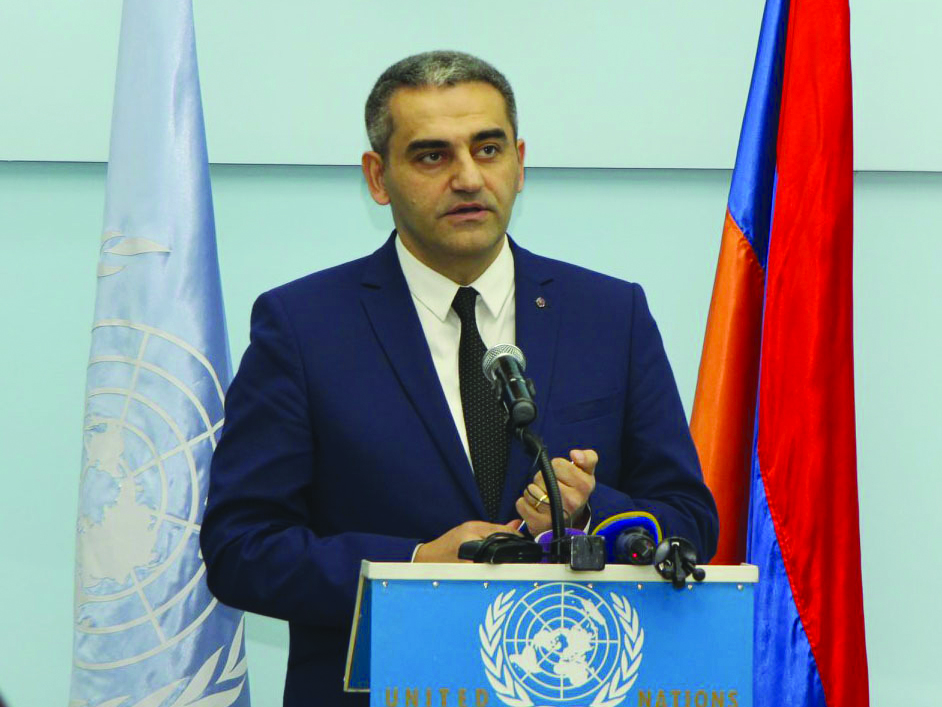
Staff Report
Dr. Suren Manukyan has been named as the 18th Henry S. Khanzadian Kazan Visiting Professor in Armenian Studies at Fresno State for the Fall 2021 semester. Dr. Manukyan is the Head of the UNESCO Chair on Prevention of Genocide and Other Atrocity Crimes at Yerevan State University and Head of the Department of Comparative Genocide Studies at the Armenian Genocide Museum-Institute (Yerevan). He is also a visiting lecturer at the American University of Armenia. He has been a Fulbright Scholar at the Center for the Study of Genocide and Human Rights at Rutgers University in New Jersey.
Hye Sharzhoom conducted an interview with Dr. Manukyan to learn more about him.
Tell us about your background, where you were born, early education, and community involvement.
I was born in Gyumri, the second largest city in Armenia, with a rich historical background and traditions. I loved history from my school years and was sure that it is a path I would choose. It was the time of the decline of the Soviet Union and the creation of the Republic of Armenia. Being interested in history, I entirely felt the significance of the historical period. I was an active teenager and attended all of the demonstrations that occurred in our city. In 1988, at the age of 12, the great Earthquake happened and Gyumri was devastated. It was a hard time. We went to school in temporary rooms among the ruins. Then the war broke out in Artsakh, the Armenian population of this region was on the verge of extinction due to Azerbaijan’s policy. My neighbors, older friends were going to the front, and I could feel the breath of history by my side again.
Where did you attend university and what did you study?
I studied International Relations at Yerevan State University. Initially, I was interested in medieval history and the relationship within multi-religious, multicultural societies.
Then my interests switched to the Middle East and I spent a year in Damascus, Syria, learning Arabic. Later, I did my Ph.D. on Islamic radicalism in Syria and worked at the Institute of Oriental Studies. However, since 2007 I have been researching the final years of the Ottoman Empire and its policies in the Arab and Armenian provinces.
I inevitably had to deal with the Armenian Genocide as it is part of my family story. Gyumri (Alexandropol) became a big orphanage after the Armenian Genocide. More than 30,000 children who lost their parents during the Armenian massacres in the last years of the Ottoman Empire found shelter and grew up in orphanages established in the city.
My grandmother Hranush and her brother Suren were among them. My grandmother never narrated the story of her life to her children, trying to protect them from trauma. Still, at the end of her life, she began to tell the story of her parents’ loss and the days she spent in the American orphanage to us, her grandchildren. Family history and my love to the Middle East overlapped when I started working at the Armenian Genocide Museum-Institute in 2007.
Tell us about any special projects or awards that you have won.
I worked for fourteen years as the Deputy Director of the Armenian Genocide Museum-Institute, and I engaged in creating and organizing numerous museum exhibitions as well as editing many academic publications and two peer-reviewed journals: Journal of Genocide Research (in Armenian) and the International Journal of Armenian Genocide Studies (in English).
In 2015 I became one of the authors of a new permanent exhibition of the Armenian Genocide Museum.
I have been a member of the International Association of Genocide Scholars (IAGS) since 2012.
I served as a member of IAGS’s Resolutions Committee (2015-2017) and was elected twice (2017 and 2019) as a member of the organization’s Advisory board.
Since 2015 I have been the director of the biannual conference of the IAGS.
I am also a member of the Society of Armenian Studies (SAS) and International Committee of Memorial Museums in Remembrance of the Victims of Public Crimes (IC MEMO ICOM).
Have you taught at other universities?
I have been teaching different courses for many years at various universities. Recently I have taught several genocide-related courses such as “Understanding Genocide,” “Comparative Genocide Studies,” “The Armenian Genocide,” and “The Holocaust” at Yerevan State University and the American University of Armenia.
What attracted you to the Kazan Visiting Professorship at Fresno State?
Fresno is a famous city for Armenians. William Saroyan and Soghomon Tehlirian are enough to demonstrate its centrality in the Armenian spiritual life.
In 2012-2013, I was a Fulbright visiting scholar at Rutgers University of New Jersey and was invited to deliver a public lecture at Fresno State.
It was very inspiring, and I started to search for opportunities to build closer ties with the university and the Armenian Studies Program.
Dr. Sona Harutyunyan, present at the lecture, advised me to apply for the Kazan professorship.
The list of previous Kazan Visiting Professors is so impressive that it motivated me to join this “club.”
What are you most looking forward to at Fresno State?
The topic of genocide is not an issue of the past but a very actual phenomenon; it is also one of the most critical problems in contemporary international politics.
It also raises questions that relate to our social life and it helps us to comprehend human nature and behavior.
I look forward to communicating with students to understand how students living in the United States assess and comprehend these topics. I expect new viewpoints, fresh ideas, and new perspectives.
 Hye Sharzhoom Armenian Action
Hye Sharzhoom Armenian Action